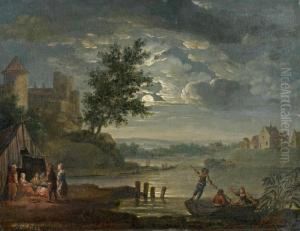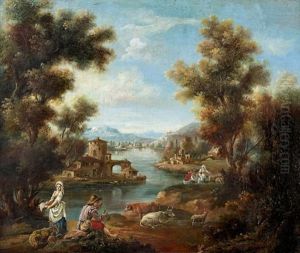Jean Antoine Vernet Paintings
Jean Antoine Vernet, commonly known as Claude-Joseph Vernet, was a prominent French painter of the 18th century, celebrated for his maritime landscapes that blend the grandeur of nature with the drama of the sea. Born on August 14, 1714, in Avignon, France, into a family of painters, Vernet developed an early interest in art, guided by his father, Antoine Vernet, a skilled decorative painter. His initial training in Avignon laid the foundation for his artistic journey, but it was his move to Italy, particularly Rome, in 1734 that significantly shaped his career. In Rome, Vernet immersed himself in the study of classical art and was profoundly influenced by the works of the great landscape painters of the 17th century, such as Claude Lorrain and Salvator Rosa, whose styles are echoed in Vernet's attention to atmospheric effects and naturalistic detail.
Vernet's talent in capturing the beauty and the peril of the sea quickly earned him a reputation among collectors and patrons. His seascapes, characterized by meticulous detail, dramatic lighting, and sublime portrayal of the sea in its various moods, resonated with the Enlightenment-era fascination with nature and its forces. In 1753, Vernet was called back to France by King Louis XV, who commissioned him to paint the ports of France, a monumental project that would occupy him for the next decade. These works, collectively known as the 'Ports of France' series, are considered his masterpiece, showcasing not only his skill as a painter but also his observational precision in depicting the bustling activity and architectural details of French port cities.
Throughout his career, Vernet remained a prolific artist, producing a vast number of paintings, drawings, and etchings. His works were sought after by collectors across Europe, and his influence extended beyond his lifetime, affecting the course of landscape painting in France and beyond. Despite his success, Vernet maintained a humble persona, focusing on his work and his family, including his son, Antoine Charles Horace Vernet, and grandson, Horace Vernet, who would both become accomplished artists in their own right.
Vernet's legacy is characterized by his mastery in portraying the sea, capturing its myriad faces from the calm of a Mediterranean harbor at dawn to the terror of a nocturnal shipwreck. His ability to convey the sublime beauty and power of nature, making the viewer feel the spray of the sea and the warmth of the sun, remains unparalleled. Claude-Joseph Vernet died on December 3, 1789, in Paris, leaving behind a body of work that continues to be celebrated for its artistic beauty and historical significance.




